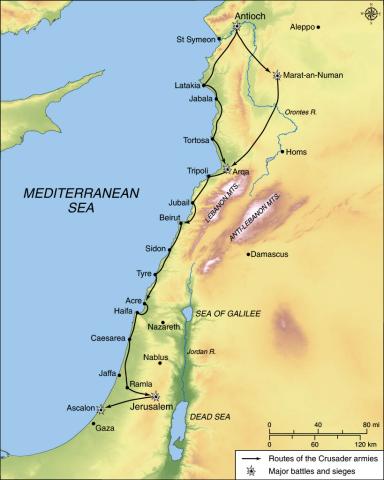The March to Jerusalem
[10.30.3] Erat autem ibi quīdam mīles dē exercitū comitis Sānctī Egidīī, cui nōmen Raimundus Pilētus. Hic plūrimōs retinuit hominēs, mīlitēs ac peditēs. Ēgressus est ille cum collēctō exercitū ut virīliter introiit in Saracēnōrum terram, et prōfectus est ultrā duās cīvitātēs et pervēnit ad quoddam castrum cui nōmen Talamānia. Habitātōrēs castrī, scīlicet Syriānī, cōnfestim suā sponte sē trādidērunt eī. Cumque omnēs essent ibi ferē per octo diēs, nūntiī vēnērunt ad eum dīcentēs quoniam hīc prope nōs est castrum Saracēnōrum multitūdine plēnum. Ad hoc castrum īlicō iērunt Chrīstī mīlitēs peregrīnī, et undique invāsērunt illud, quod continuō ab illīs captum est, Chrīstī adiūtōriō. Apprehendērunt igitur omnēs illīus locī colōnōs, et quī Chrīstiānitātem recipere nōluērunt, occīdērunt; quī vērō Chrīstum recognōscere māluērunt, vīvōs cōnservāvērunt.
notes
(July 1098) Raymond Pilet collects a contingent of crusaders and (ignoring the decision to wait) pushes into Syria. One fortified village of Christians comes over to him. Raymond then takes a Muslim village, and kills or converts the inhabitants.
Raimundus Pilētus: Raymond Pilet, from Narbonne-Pilet in Languedoc.
retinuit: “took into service.”
Talamānia: now Tel Mannas, in northern Syria
quoniam: would perhaps be quod in CL; the usage is typical of LL/ML.
hīc prope nōs: our author is apparently now marching with Raymond of Toulouse, presumably because Bohemond was staying in Antioch rather than proceeding to Jerusalem.
castrum Saracēnōrum: the village of Maarat an-Nu’mân (Marat-al-Numan).
multitūdine plēnum: “filled by a multitude of Saracens”; ablative of means.
illud: refers back to hoc castrum.
quī vērō Chrīstum recognōscere: “as for those who wished to recognize Christ."

